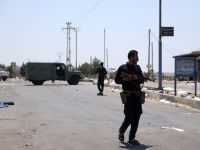ALBAWABA - The release of three Israeli prisoners by Hamas' Al-Qassam Brigades on Saturday was marked by a large-scale military and security mobilization, which analysts see as a direct challenge to Israel’s post-war plans for Gaza.
The highly coordinated deployment of Hamas fighters reinforced the group’s presence, contradicting Israeli claims of having significantly weakened its military structure.
According to Al Jazeera, Al-Qassam units were widely deployed across Khan Younis and Gaza’s port to secure the prisoner transfer to Red Cross officials. The operation saw the involvement of Zaytoun, Shuja’iyya, Al-Shati, and Tuffah battalions, along with infantry, snipers, and anti-armor units.
The Al-Qassam Shadow Unit, responsible for detaining Israeli prisoners, played a leading role in the exchange, demonstrating that Hamas maintains operational control over its forces despite the loss of key leaders.
Fighters carried Ghoul sniper rifles, used in past operations against Israeli troops, alongside Tavor rifles seized from Israeli soldiers. Hamas also used a captured Israeli military vehicle during the transfer of Yarden Bibas and Ofer Calderon, a move seen as a symbolic message to Israel.
Al-Qassam’s anti-armor division showcased Yassin rockets, which have been used to target Israeli tanks and armored vehicles throughout the war.
The exchange ceremony took place along Al-Rashid Street, a key route for displaced Gazans returning north. Al Jazeera analysts noted that Hamas’ decision to hold the handover in this area was deliberate, reinforcing its resistance narrative and presence across Gaza.
During the event, fighters displayed images of fallen Hamas leaders, including Mohammed Deif, emphasizing that despite leadership losses, the group's military structure remains intact.
Israel has sought to eliminate Hamas' control over Gaza, but Al Jazeera reported that Washington remains concerned about the risk of a power vacuum. The Biden administration’s position on Gaza’s future remains uncertain, though Trump's previous suggestions of relocating Gazans were widely rejected by Egypt, Jordan, and Palestinian leaders.










